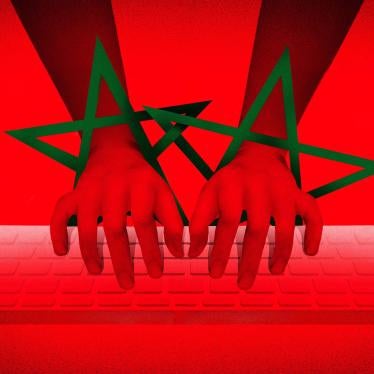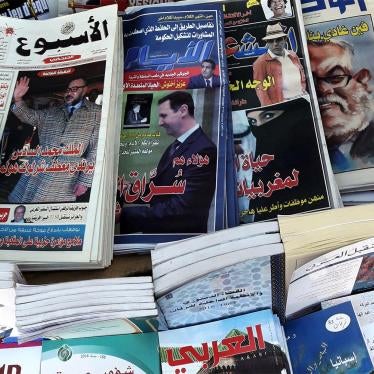(New York) - The Moroccan authorities should stop the apparently politically motivated harassment of two outspoken journalists, Ali Amar and Zineb El Rhazoui, Human Rights Watch said today.
The police broke down the door of El Rhazoui's apartment at 5:45 a.m. on June 4, 2010, and, without first getting her permission as required by law, searched her home in an intentionally humiliating way. They proceeded to detain her and Amar for 12 hours, then re-arrested Amar on June 7 and held him for 24 hours.
The pretext for these measures is a theft complaint, filed by a business associate of Amar, for which Amar is to go on trial June 10. However, the authorities' use of the complaint to raid El Rhazoui's home and to question the journalists about their writings and private lives shows a determination to punish and discredit them for their writing and activism.
"The police have pounced on a business dispute to harass and humiliate two bold journalists," said Sarah Leah Whitson, Middle East and North Africa director at Human Rights Watch. "The police misconduct gives every reason to fear what kind of justice awaits Ali Amar."
Amar and El Rhazoui both worked for Morocco's outspoken newsweekly, Le Journal Hebdomadaire, before it closed in January. Le Journal had been subject to mounting government-backed pressure, including crushing financial judgments imposed by the courts in politically driven libel cases.
Amar is also the author of Mohammed VI: The Big Misunderstanding (Mohammed VI, Le grand malentendu), a critical account of the Moroccan king's rule that was published in France in 2009 but was banned in Morocco. He continues to write on controversial subjects: in May, he contributed an article to the French magazine Marianne criticizing Moroccan authorities for trying to placate Islamists by persecuting gays.
El Rhazoui, after leaving Le Journal, has done freelance writing, mostly for foreign publications. An essay she wrote deploring Morocco's recent expulsion of Christian expatriates appeared in the April 2010 Spanish edition of Le Monde Diplomatique. She appeared on France's TV5 television in late April, criticizing Morocco's treatment of gays.
El Rhazoui is also a co-founder of a group called Mali, the "Mouvement alternatif pour les libertés individuelles" (Alternative Movement for Individual Liberties). The government previously arrested her on September 13, 2009, as she was about to participate in a Mali-organized picnic to protest a Moroccan law that prohibits Muslims from eating in public during Ramadan fasting hours. On May 2, 2010, police in Casablanca again briefly detained her and others to prevent them from holding a Mali-organized sit-in to raise awareness about sexual harassment.
El Rhazoui told Human Rights Watch that the June 4 home search began when about 15 police officers in plainclothes briefly knocked on her Casablanca apartment door and rang the bell, then broke in by forcing the door off its frame. The group included senior officers of the Casablanca judicial police. El Rhazoui said later that the agents neither asked her permission nor presented a search or arrest warrant, but searched and photographed each room of the apartment. El Rhazoui said the police later told her that they were investigating a complaint that Amar had stolen a computer and other materials from a business partner. They had apparently expected to find Amar at the apartment.
Among the objects that the police photographed were two empty bottles of wine on the dinner table and personal items in the bathroom. Morocco has no law prohibiting the consumption of alcohol in private. El Rhazoui said the police at one point tried to push both her and Amar into the bedroom to photograph them there, but they resisted.
The police seized an external hard drive, a laptop computer that Amar told them belonged to him, a memory card from El Rhazoui's camera, and the two empty wine bottles. The police then took Amar and El Rhazoui to a police station in Casablanca and questioned both before releasing them 12 hours later, at around 7:30 p.m.
El Rhazoui told Human Rights Watch that the police questioned her briefly about the theft allegations, explaining that the complainant had named her as an accomplice. But she said the police devoted most of their questions to her private life and her relationship with Amar. Her responses to their questions, such as whether she had sexual relations with Amar, whether there were condoms in her apartment, and whether she drank wine, figured in the written statement the police typed up and that she signed before her release, she said.
Amar told Human Rights Watch that the police asked him numerous questions about the theft allegations but also devoted much time to interrogating him about his book about the king, his article about gays in Marianne, and his future plans as a journalist, among other topics unrelated to the alleged crime.
"This heavy-handed invasion of a Moroccan citizen's residence and irrelevant questioning about people's private life shows the arbitrary behavior of the police and therefore is an assault on the privacy rights of all Moroccans," Whitson said.
The search of El Rhazoui's apartment apparently violated Moroccan law in that the police did not first obtain the owner's permission, as per article 79 of the code of penal procedure, and allegedly carried out the operation before 6 a.m., whereas article 62 of the code requires searches to take place only between 6 a.m. and 9 p.m., with narrowly defined exceptions.
The police told Amar to report again on June 6 for further questioning, but he refused to do so in the absence of a written summons. At about 3:45 p.m. on June 7, the police arrested him on a downtown Rabat street, transported him to Casablanca, presented him to a prosecutor, and finally released him after 24 hours. The prosecutor informed him that he would stand trial for theft under article 505 of the penal code and that the trial would begin on June 10 in the Ain Sbaâ Court of First Instance. He faces up to five years in prison and a fine if convicted.
The police contacted El Rhazoui on June 7, telling her to come to the police headquarters in Casablanca. When she did so the following morning, they told her to remain available for questioning and then released her. She has not been charged.
"There is a proper way for the police to investigate a criminal complaint, respecting the presumption of innocence," Whitson said. "By treating these two journalists as criminals, by invading their privacy in their search and in their questions - in apparent disregard for Morocco's own laws - the police have shown that their real motive lay elsewhere."






